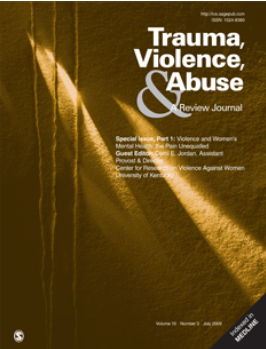种族灭绝相关创伤代际传播的系统综述。
IF 5.4
1区 社会学
Q1 CRIMINOLOGY & PENOLOGY
引用次数: 0
摘要
世界各地的国家和人口继续面临内战,特别是种族灭绝。与种族灭绝有关的创伤的影响已被证明会持续数十年,对幸存者及其后代造成终生影响。尽管具有独特的文化背景和条件,但世界各地的种族灭绝在性质上有许多共同的描述。这篇关于种族灭绝相关创伤的代际影响的系统综述旨在更好地了解知识状况及其对后代的影响。本文综述了同行评议文章中探讨的方法和传播机制。本综述共纳入了36项研究,研究结果突出了一些方法上的差距,如缺乏混合方法的研究设计,重点主题的差异,以及缺乏必要的整体方法来捕捉创伤暴露及其对后代的影响。本综述还揭示了种族灭绝幸存者之间的共同创伤暴露,以及有种族灭绝历史的国家之间创伤传播的潜在机制。通过父母教养方式、亲子依恋和家庭功能的创伤传播机制在不同文化背景下具有可比性。鉴于种族灭绝创伤的复杂性,并且由于特定的养育价值观和家庭功能的特征在文化和背景上是独特的,理论上合理的方法和测量对于未来的循证研究是必要的,以解决种族灭绝创伤的复杂性和背景因素及其传播机制。这些发现有助于更好地理解这一重要研究和实践领域的关键差距。本文章由计算机程序翻译,如有差异,请以英文原文为准。
A Systematic Review on Intergenerational Transmission of Genocide-Related Trauma.
Countries and populations across the world continue to face exposure to civil war, particularly genocide. The impacts of genocide-related trauma have been shown to last for decades, leaving lifetime impacts on the survivors and their offspring. Despite unique cultural contexts and conditions, genocides across the world share many common descriptions in nature. This systematic review on intergenerational effects of genocide-related trauma aims to better understand the state of knowledge and implications for the impacts on subsequent generations. This review focuses on the methodology and the mechanism of transmission explored in the peer-reviewed articles. With the total of 36 studies included for this review, the findings highlighted a few methodology gaps in the lack of mixed-method research designs, differences in key themes of focus, and lack of holistic approach to necessarily capture trauma exposure and its outcomes in subsequent generations. This review also revealed the shared trauma exposure among genocide survivors and the underlying mechanisms of trauma transmission across countries with genocide history. The mechanism of trauma transmission via the parenting style, parent-child attachment, and family functioning are shown to be comparable across diverse cultural contexts. Given the complexity of genocide trauma and because specific parenting values and the characters of family functioning are culturally and contextually unique, theoretically sound methodology and measurement are necessary for future evidence-based research to tackle the complex and contextual factors of genocidal trauma and the transmission mechanism. The findings contribute to better understanding of the critical gaps in this important area of research and practice.
求助全文
通过发布文献求助,成功后即可免费获取论文全文。
去求助
来源期刊

Trauma Violence & Abuse
Multiple-
CiteScore
13.60
自引率
7.80%
发文量
131
期刊介绍:
Trauma, Violence, & Abuse is devoted to organizing, synthesizing, and expanding knowledge on all force of trauma, abuse, and violence. This peer-reviewed journal is practitioner oriented and will publish only reviews of research, conceptual or theoretical articles, and law review articles. Trauma, Violence, & Abuse is dedicated to professionals and advanced students in clinical training who work with any form of trauma, abuse, and violence. It is intended to compile knowledge that clearly affects practice, policy, and research.
 求助内容:
求助内容: 应助结果提醒方式:
应助结果提醒方式:


